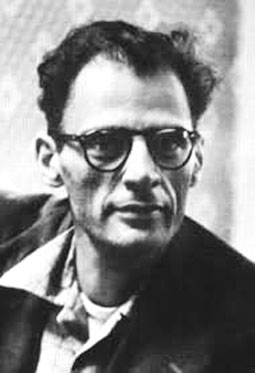By JERRY TALLMER
Volume 74, Number 41 | February 16 – 22, 2005
Reflections
A playwright even more complex than his characters
“Elia Kazan: A Life” was the direct, no-nonsense title of Kazan’s 1988 autobiography. “Timebends: A Life” was the more poetic title of Arthur Miller’s no less fascinating 1987 autobiography. One doesn’t think of Arthur Miller, the man, as the more poetic of the two, but this past weekend, on the heels of the death at 89 of one of our arguably greatest playwrights, I reread “Death of a Salesman” for the umpteenth time, digging for the poetry within the so-called realism, and of course I (once again) found it.
It jumps right out at you from the 10th line of the opening (Act I) stage directions, preparing the ground for Willy Loman’s slow, exhausted entrance lugging those two large sample cases — his return home from his aborted sales trip to New England. “An air of the dream clings to the place,” Miller tells us of the salesman’s little lost house in Brooklyn, “a dream rising out of reality.”
That says it for the whole play, with its luminous, rhythmic timebending fade-ins, fade-outs of past, present, never will be and never was: a dream rising out of reality.
Even within that reality, there is poetry and to spare. The supreme example of it is, needless to say, Willy Loman’s wife Linda’s agonized declamation to her and Willy’s thankless sons. Famous as it is and has been from the word go, it is worth reprinting here in its brief entirety, and anyone who first heard it in the gentle, impassioned, quavering voice of Mildred Dunnock will hear it in that voice forever:
“Then make Charley [the Lomans’ smug, successful neighbor] your father, Biff. But you can’t do that, can you? I don’t say he’s a great man. Willy Loman never made a lot of money; his name was never in the paper; he’s not the finest character that ever lived. But he’s a human being, and a terrible thing is happening to him. So attention must be paid. He’s not to be allowed to fall into his grave like an old dog. Attention, attention must be finally paid to such a person.”
During her hitch as drama critic of Partisan Review, Mary McCarthy in her hauteur sniffed at what she felt Miller, for all the truth-telling, was hiding here. That “attention must be paid” line could only have come out of the mouth, McCarthy said, of somebody who was Jewish — more yet, lower-class Jewish, garment-district Jewish, Brooklyn Jewish, the sniffer implied.
But Arthur Miller, whose father was in fact a prosperous Manhattan coat manufacturer, put none of the Jewishness per se into “Death of a Salesman,” and it was one of the gaps that I myself had deep reservations about for many years, and still do. It was like a missing organ, a missing tooth, and it bespoke a certain falseness in the drama’s stripped-bare actuality.
And yet, and yet: two things. The first words of Arthur Miller’s I ever read in my life were those of the post-World War II “Focus,” some four or five years before the emergence of playwright Miller — a crisp, tough-minded novel about anti-Semitism. And Jewish or not, the universality of “Death of a Salesman” has stretched, through more than a half-century, around the globe, notably in these later years, to Beijing, China.
It is obvious to me that the young Edward Albee of the 1950s who wrote “The American Dream” must have read, or seen, or both, the “Death of a Salesman,” which ripped the American dream apart from the moment the curtain first rose upon it in Kazan’s brilliant production, starring unforgettable Lee J. Cobb, at the Morosco Theatre in 1949. And if Albee, likewise many others.
It is perhaps less obvious that a young Lorraine Hansberry must also have read or seen it, or both, until you come to Mama Younger’s great peroration in “A Raisin in the Sun,” which resounds in these ears in the leonine tones of Claudia McNeil. It is addressed to daughter Beneatha, who has just said “There is nothing left to love” in her messed-up brother, Walter Lee Younger:
“There is always something left to love,” Lena Younger thunders. “And if you ain’t learned that, you ain’t learned nothing . . . Child, when do you think is the time to love somebody the most? When they done good and made things easy for everybody? Well then, you ain’t through learning — because that ain’t the time at all. It’s when he’s at his lowest and can’t believe in hisself ’cause the world done whipped him so. When you start measuring somebody, measure him right, child, measure him right….”
Another reality drama. Another embracement of humanity. Another poetry.
But Arthur Miller was more complex than perhaps any of the characters that populate his works. In a way, in defying the witch-hunters of the HUAC era he was as courageous as Giles Corey, the old free-thinker of “The Crucible” who, pressed to death by massive stones piled on his chest by the witch-hunters of Salem, Massachusetts, 250 years earlier, called for “More weight!” rather than speak a lie or name false names.
Once, years ago, some ignorant, bigoted New York City school board or Board of Education banned the performance of some play or plays of Miller’s. Very well, then, Miller wrote in a statement that probably still exists in the library clips at the New York Post and at this remove I have to paraphrase: Very well, then, let us now see if bureaucracy can accomplish what no bureaucracy in the history of the world has ever accomplished — a creative act.
I call that not just guts, but guts a la mode.
Yet in a way, Arthur Miller was also less than courageous, or in any event, was willing (like most of us) to compromise his principles when it came to career and the main chance.
How could this man of “rabbinical righteousness” (as producer Robert Whitehead saw him), who for years would not speak or shake hands with the Kazan who (like Lee J. Cobb) had named names in the 1950s, go back, without a fare-thee-well, to work with “Gadge” [Kazan] in 1964 when the fledgling Lincoln Center Theater Company entered the world (in temporary quarters on Washington Square) via Miller’s “After the Fall”?
For that matter, what kind of courage, or principles, could have led two grown men, two major artists, to caper together, in a work put before the public and the public press, over the grave of a gorgeous, troubled woman they had both slept with, and one of them had married? I never understood this then, and do not now.
In 1964, when “After the Fall,” starring Barbara Loden (soon to be Mrs. Elia Kazan) in a wig that made her a look-alike for Marilyn Monroe, was about to open, the New York Post set me in pursuit of dress rehearsal photographs taken by Miller’s wife Inge Morath. I reached her by telephone. She laughed heartily and said: “Arthur would kill me if he knew I was talking with you.”
I don’t remember if we ever got the photographs — I don’t think so — but 24 or 48 hours later I bumped into Arthur Miller himself, large as life, in the lobby of the Hotel Chelsea. I started to say: “Mr. Miller, I’m from the New York Post and” — when the guy exploded.
“You invaded my privacy!” shouted the man who on the stage at Washington Square was about to lay bare, for all the world to see, not just the tormented privacy of a woman, a wife, now dead, but a goodly share of his own privacy. “You! — you! — you!” he kept screaming, as if I was the New York Post incarnate. I thought he was nuts — he also seemed about 11 feet tall — and I walked away from it.
Years later, still working for the New York Post, but in Mr. Miller’s case on less volatile stories — one of them may have been about the Beijing “Salesman,” and another on the suicidal state of Broadway — I at least twice interviewed him in his East 60s apartment. They were very affable, informative interviews, with not one mention, by him or me, of that Hotel Chelsea fireworks. (Nor, for that matter, of a piece or two I’d done on his very nice, very gifted photographer wife.)
Be all that as it may, what remains is the work: “All My Sons,” “The Crucible,” “A View From the Bridge,” “An Enemy of the People,” “Timebnds,” et al, and in particular “Death of a Salesman.”
At the Morosco Theatre in 1949, my brother’s wife, Margo, was dissolved in tears at final curtain. “It’s your father’s story,” she managed to gasp through her sobs. Well, it was and it wasn’t, and that was one of my problems with the play. What I’d just seen was (for all the poetry that did not hit me then) too black and white, too schematic.
That was then. Over the years, the play grew on me, and today, rereading it this past weekend, I see that in its main outlines — what corporate America does to the human beings it chews up and spits out — it is indeed not too far from my father’s story. And not just his. Mine. Everybody’s. Yours too.

































